It was James’ idea to go to Estonia. Something about the little country felt right, the Baltic sea, the history, the sense of making our way off the beaten path.
It had been a rough April in the USA, the Supreme Court tilting right, the death of the Senate, war on the horizon, hostilities expanding.
“April is the cruelest month, breeding…” Elliot famously wrote.
So Elliot descents into the Wasteland, like Virgil and Dante before him, adding a modern spring twist to the story.
The trip away would be welcome respite, a time for reimagining, rethinking things. We’d stay in the old city quarter of Tallinn, the capital of this small country.
So I got the cheapest ticket I could to meet James and Rob, my usual spring break buddies. What I did not notice was the layover in Russia. I’d travel to and leave from Moscow, its presence a reminder of Cold Wars past.
The Unbearable Lightness of Being the week before had been our topic for book group, reminding of tanks rolling in to crush Prague Spring.
On the flight I read Last Train from Estonia, Jaak Jurison’s memoir about getting out of occupied Estonia during the war. Growing up in independent Estonia, life changed in 1940 when the Soviets rolled in, eventually jailing his father, sending him and thousands of others Siberia. The reign of terror had begun. Families were separated, kids killed. The Nazis were soon to follow, only to be followed by the Russians again. In 1945, Jurison’s family ran, taking the last train from Estonia. The Soviets would remain for another 46 years.
Today, NATO ships sit just outside and Russia’s Putin bides for the Soviet past.
“They give Putin pause,” noted a colonel in the Estonian army we met. “He doesn’t want to get in a war with two nuclear armed countries.”
Rob and James would meet me there on Tuesday night. I’d have to leave a day ahead of them to meeting them there. So I made my way out to the airport on Monday.
From the beginning this trip would be different.
“Be prepared for bureaucracy,” Caroline advised.
“We can’t take these,” explained the woman in security, pointing me to the long line at the Aeroflat where I’d have to get them to print out my boarding pass because they do not take home print outs.
So I got in the long line, hoping not to be too delayed.
She was laughing when I got back to her.
“See I told you they wouldn’t take them.”
I wouldn’t arrive in Tallinn until the next day.
James was the first to join me at the Hotel Barons the art deco spot where we stayed in the old city.
Rob wouldn’t arrive for a few more hours. So James and I settled in for a pint and a chat. The conversation would last well into the night, exploring and chatting, meeting Rob and continuing the conversation, over at a Soviet Era spa, wandering through the old city, out to the modern periphery, to the beach, where we stumbled upon a 15th century abbey, the Pirita Convent, crumbling with age. We wandered through the sort of cemetery which gave Sabina a sense of peace in Unbearable Lightness.
For much of the morning, it snowed. Dark clouds seemed to be looming over the country.
We walked over to the train station after our trip to the spa, chatting about the old Russian men whose parents were lured to live here, and perhaps even used that spa. Now they sit in the spa, yielding birch leaves on their backs, wearing their spa caps, keeping the warmth inside.
“The trains all seem to go East, to Russia… I can’t find any that go in any other direction, toward Europe,” observed Rob.
“I wonder where Jurison’s train lead? It got them out of Estonia ahead of the Soviets in 1945.”
And then in 1991 the people of Estonia found their independence anew. They circled the city holding hands as a sign to the world. Not again.
Would the populist movement gripping Europe hold Estonia? Would Estonia maintain its independence? Would democracy endure in the US?
We kept walking up to the top of a hill outside the station.
“I’m sure this was where an old Lenin statue once stood,” noted Rob. “The Revolution was a hundred years ago and few Russians seem that interested in celebrating it.”
You see more soldiers on the street, noted Rob, reflecting on the troubles of the Stalin era here, when a knock on the door could mean a trip East never to return.
So the conversations shifted to more personal matters, kids and pain. Old friends and unsettled scores, regret and hopeful laments. We all gossiped a bit.
What are you writing, how is teaching, marriage, etc. Where do you go with all the feelings of growing up? Who molded you? What are our obligations to each other?
The conversations extend from our years in college, out to Los Angeles, New York, their moves out to Europe, memories, road trips, and stories.
We ate oxtail soup and meandered about chatting with as many friends as we could. There was the colonel and the professor, the young editor and the grumpy bar owner. The city opened itself up again and again and again. The last night, we wandered over to the Sigmund Freud bar where we drank Absinthe and talked about books and where its all going, staying well into the evening before making our way back to the hotel where we drank in the smoking room, keeping ourselves up way into the morning before we made our way out of the old town, bidding Tallinn adieu. Next year Hong Kong or Panama or maybe New Orleans?
“Write your novel like Sophies Choice,” Rob advised, the Southerner wondering about what it all meant.
I’ll try.
Robs Top five novels in no particular order:
Pride and Prejudice
The Idiot
Anna Karenina
Moby Dick
And Brother’s Karamazov
James’s
Pride and Prejudice
This Side of Paradise
Platform
And Beautiful Ruins
Ben’s
Giovani’s Room
Anna Karenina
Brother’s Karamazov
Aunt Julia the Scriptwriter
Huck Finn
100 Years of Solitude
And a memoir:
North Towards Home
They are all stories we look to as shape our lives through the years, finding meaning in the losses, and ways to cope with the failures.
On the way home, including a layover in Moscow, I opened up The Unbearable Lightness of Being, reflecting on the ways the characters situated the struggles of their lives in literature and questions about weight. To live well is to carry weight, to carry responsibility, to handle the ways happiness sometimes eludes us but we keep on. I thought about our conversations about supporting each other, of angels who look out for us, and the need to care, to find and openness in our everyday lives. This is what coming out is all about, its about being who one is and looking out for others, declaring the authenticity of our anguish matters; our engagements; our friendships; our connections matter.
“Early in the novel that Teresa clutched under her arms when she went to visit Tomas, Anna meets Vronski in curious circumstances: they are at the railway station when someone is run over by the train.” Kundera is taken by the symmetrical composition of this tragedy, suggesting that human take lives a similar shape, following the same motifs. “They are composed like music. Guided by this sense of beauty, an individuals transforms a fortuitous occurrence (Beethoven’s music, death under a train) into a motif which then assumes a permanent place in the composition of the individual’s life. Anna could have chosen another way to take her life. But the motif of death in the railway station, unforgettably bound to the birth of love, enticed in her hour of despair with its dark beauty. Without realizing it, the individual composes his life according to the laws of beauty, even in times of greatest distress… It is right to chide a man for being blind to such coincidences in his daily life.”
The years of spring break adventures with Rob and James strike me as just such “a motif”. Over and over; these meetings “then assume a permanent place in the composition of" my life” adding “a dimension of beauty…” Thank you for that guys.
Back home the girls played and we talked about the trip. It had been a grand one.
Here are some pictures of my notes from the old book that i first read in 1988, senior year in high schoool, only to re read this year, almost three decades later.
 |
| A final laugh in Tallinn among friends. |






















































































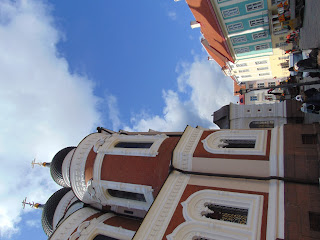












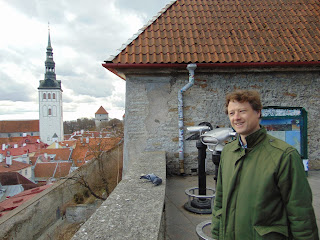

























































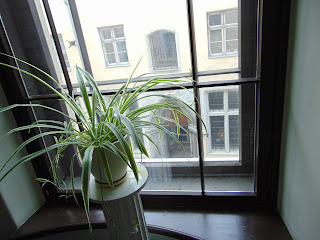









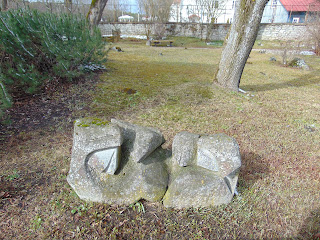

































































































































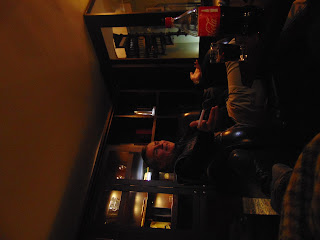



No comments:
Post a Comment